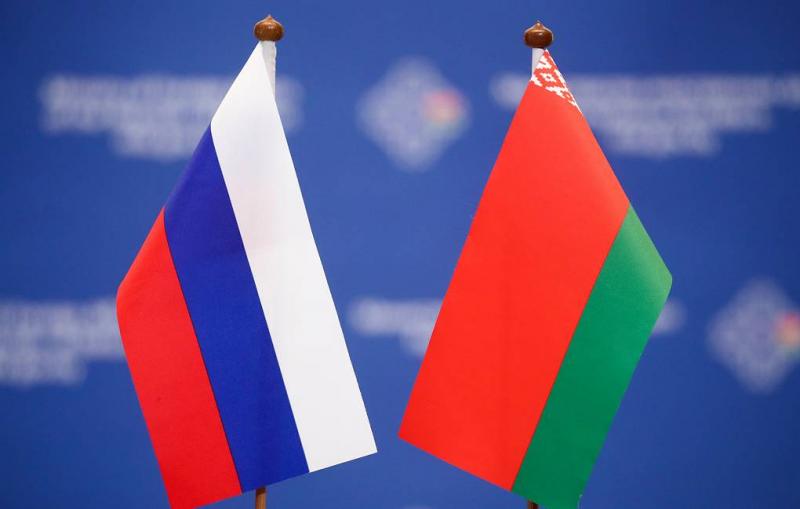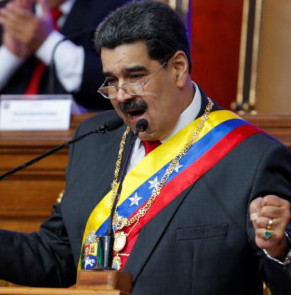
- Press review: US lets Kiev use anti-personnel mines and Iran may halt uranium enrichment
- Press review: Uranium costs soar as Moscow updates nuclear doctrine and US OKs attacks
- Press review: Russian air defenses can down Western missiles as EU conducts live exercise
- G20 leaders adopt Rio de Janeiro Summit Declaration
Ukraine seeks to prove its effectiveness to US president-elect Donald Trump; Russia and Belarus finalize a security agreement amid external threats; and China is preparing for Trump’s second term as US president. These stories have dominated Monday’s newspaper headlines across Russia, according to TASS News Agency.
Media: Ukraine aims to showcase its effectiveness to US President-elect
The Ukrainian authorities are trying to increase the intensity of escalation and show their effectiveness to US President-elect Donald Trump, said experts interviewed by Izvestia. While officials make statements about a possible withdrawal of funding for the Kiev regime, the Ukrainians attempted massive drone attacks on the Russian capital and other regions on November 10 and 11. However, none of the UAVs reached their target.
Kiev is eager to demonstrate to Trump that the Ukrainian armed forces are capable of continuing military operations, military expert Vasily Dandykin said. "Kiev seeks to raise tensions to a level where it would be difficult for Trump to halt the escalation," Roman Shkurlatov, a retired lieutenant colonel and chairman of the Officers of Russia public organization, pointed out. The goal of another massive drone attack on Russia was to persuade the incoming US government to sustain military assistance to Ukraine, agrees Bogdan Bezpalko, a member of the Russian Presidential Council on Inter-Ethnic Relations.
The Ukrainian army wanted to illustrate its ability to strike Moscow, military expert Vladislav Shurygin emphasized. "The way the attack was carried out makes it clear that it was a provocative move," he explained. "We did not see any specific targets. The use of unmanned aerial vehicles, which cannot destroy anything but only cause damage, exposes the coercive tactics," the expert added.
Kiev has no plans to shift to peace talks but anticipates further assistance from its allies, Nezavisimaya Gazeta notes. That said, the US is set to provide substantial military support to Ukraine through military specialists. Western media outlets report that the Biden administration has lifted the actual ban on sending American defense contractors to Ukraine to assist the Ukrainian army in maintaining and repairing weapons provided by the US. "The internationalization of the Ukrainian conflict continues as the US is sending companies and, most likely, its military personnel to maintain US-made fighter jets and air defense systems in the conflict zone. We have been aware that they did so tacitly before, but now, they are making official statements about it. The situation is alarming and requires an appropriate response from Russia," Colonel (Ret.) Vladimir Popov, a military expert, stressed.
Izvestia: Russia, Belarus finalize security agreement amid growing external threats
Moscow and Minsk have finalized a treaty on security guarantees for the Union State of Russia and Belarus, Belarusian Security Council Secretary Alexander Volfovich told Izvestia. The document is set to be submitted for approval to the heads of state at the next meeting of the Supreme Council of the Union State in December. Furthermore, the parties have also completed work on the Union State’s security concept, which is expected to be adopted in 2025.
Such an enhancement of security cooperation stems, first and foremost, from the foreign policy situation, said Dmitry Zhuravlyov, research director of the Institute of Regional Problems and associate professor at the Financial University under the Government of the Russian Federation. "This is a response to external threats. The parties need to adapt their practices amid new foreign policy dangers. The current situation calls for new approaches," the expert asserted. Earlier, Russia introduced amendments to its nuclear doctrine. The updated version of the document states that aggression against Russia by a non-nuclear country, which involves or is supported by a nuclear power, will be regarded as a joint attack on Russia. Moreover, the doctrine also contains provisions pertaining to Belarus.
Security threats particularly include the possibility of a direct attack on Belarus from Ukraine, Yury Shevtsov, director of the Center for European Integration Problems, pointed out. "The second scenario involves an attack by nationalist armed groups made up of Belarusian immigrants, organized in Poland and Ukraine. Their goal may be to seize a town in southern Belarus and establish their own government there; after that, they will attempt to draw NATO into the conflict," the expert noted. The third possibility is that Belarus will have to engage in direct conflict with one or more NATO countries, the analyst went on to say. He pointed out that Poland and Lithuania had concentrated military equipment in areas bordering Belarus.
As for the new security concept of the Union State, which will replace a document adopted in 1999, it will include a provision on joint opposition to the policies of the United States and antagonistic NATO and European Union countries, aimed at achieving the strategic goals of mutually beneficial and equal international cooperation.
Vedomosti: China prepares for Trump's second term as US president
The Beijing authorities refrained from reacting strongly to Donald Trump’s re-election as US president. Chinese President Xi Jinping sent a congratulatory message to Trump, pointing out that the lessons of history made it clear that both China and the US benefit from cooperation and suffer from confrontation, Vedomosti writes.
During his 2024 election campaign, Trump, on the one hand, announced plans to impose high tariffs on Chinese goods but, on the other, regularly boasted of cordial relations with Xi. Moreover, Trump vowed to divide Russia and China, whose increasingly close ties he sees as the result of incumbent US President Joe Biden’s policy.
China’s reaction to Trump’s re-election for a second term in office was "restrained but deliberately constructive," said Igor Denisov, senior researcher with the European Studies Institute at Moscow State Institute of International Relations. "Beijing expects a strengthening of the trade war and a new wave of steps aimed at containing China, especially with regard to sensitive issues such as technology and Taiwan," Denisov added.
According to the expert, China is preparing to take countermeasures if the US ramps up pressure and protectionist actions. "We can see China sending clear signals about plans to strengthen its economic and technological sovereignty, develop domestic technologies, and enhance defense capabilities," Denisov noted. The analyst is confident that such a scenario in terms of relations between China and the US can only have a positive impact on Moscow-Beijing relations.
China has a special focus on the Taiwan issue, Denisov went on to say. "The risk of an escalation in the Taiwan Strait remains high. The US continues to increase assistance to Taipei, which causes concern to the Chinese military and creates the risk of incidents. However, both parties will try to avoid a direct conflict because they understand that a full-scale confrontation will benefit neither of them," he stressed.
China will definitely be a US foreign policy priority under Trump, Lev Sokolshchik, senior researcher with the Center for Comprehensive European and International Studies at the Higher School of Economics, said. According to him, the two countries’ economic rivalry can lead to a sharp escalation in bilateral relations.
Media: Russia-Africa trade reaches record levels
Trade between Russia and African countries has reached historic highs. Despite the artificial barriers created by the West, Moscow and African nations continue to strengthen economic ties, Russian Foreign Minister Sergey Lavrov said at the first ministerial conference of the Russia-Africa Partnership Forum in the Black Sea resort of Sochi, as reported by Vedomosti.
The event brought together some 1,500 guests, including ministers, heads of regional organizations, Russian entrepreneurs, and businessmen from over 40 African countries. Agreements on a number of specific projects were made on the sidelines of the conference, deals in various fields were signed, and a joint statement was adopted highlighting plans to develop the partnership.
African countries are interested in diversifying their trade and attracting Russian investment, Maya Nikolskaya, acting director of the Center for African Studies at Moscow State Institute of International Relations, said. "Many countries on the continent depend heavily on foreign loans and face serious difficulties in repaying them. Our country could offer investment in the economic sectors that are crucial to African nations," the expert explained.
Speaking about the conference, Patrick Thierry Akoloza, the Central African Republic’s minister of trade and industry, told Izvestia that such meetings created a great opportunity to deepen relations between countries.
The first ministerial conference of the Russia-Africa Partnership Forum made it perfectly clear that much progress has been achieved since the first Russia-Africa Summit held in 2019, Vsevolod Sviridov, director of the Higher School of Economics’ Center for African Studies, asserted. The parties are now discussing critical issues, pressing goals, and specific projects. Dialogue is becoming increasingly constructive and substantial. This is a very important achievement that was made in the past several years in terms of Russia-Africa relations, the analyst concluded.
Vedomosti: Diamond prices fall amid rising competition from artificial stones
Diamond prices have dropped to multi-year lows on the global market, Vedomosti writes, citing data from the Rapaport company, which owns the United States' largest diamond-trading platform. Rapaport points to the ongoing crisis in the Indian diamond industry, which has been facing excess stocks of rough stones.
Finam Strategy Director Yaroslav Kabakov notes that, apart from the Indian market’s oversaturation with rough diamonds, weak demand for jewelry in key countries such as the US and China is putting additional pressure on the market. Maxim Khudalov, chief strategist at the Vector Capital investment company, emphasizes that both countries are currently facing economic challenges. "A debt crisis is looming in the US, while China’s economic growth rates are decreasing," he explained. Kabakov projects that the situation will persist at least until the end of 2024.
Dmitry Puchkaryov, stock market expert at BCS World of Investment, points out that price trends are also affected by the increasing competition between natural and artificial diamonds, as well as by the overall changes in customers’ attitudes. The younger generation is less interested in jewelry and prefers to invest in "the economy of impressions," focusing on travel, entertainment, and other experiences.
Russia’s Alrosa is one of the world’s largest diamond-producing companies. According to its forecast, the balance between supply and demand on the market is expected to be restored in 2025. Given a decline in global diamond production due to depleting reserves, there is room for a 15-20% increase in rough and cut diamond prices in the next two years, an Alrosa spokesperson said.
The decline in rough and cut diamond prices may stop in 2025 if the existing stockpiles run low and demand recovers in key markets, Kabakov added.
TASS is not responsible for the material quoted in these press reviews









